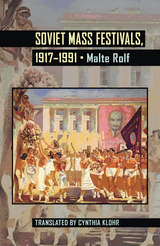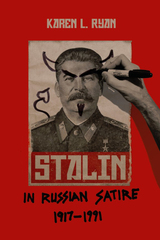
Mass festivals were a trademark of twentieth-century authoritarianism, as seen in fascist Italy, Nazi Germany, and elsewhere. But nowhere was this phenomenon more prevalent than in the Soviet Union. Despite being a dominant feature of Soviet culture, these public spectacles have been largely overlooked as objects of study by historians.
Originally published in German, Malte Rolf’s highly acclaimed work examines the creation and perpetuation of large-scale celebrations such as May Day, the anniversary of the October Revolution, Harvest Day, and others throughout the Soviet era. He chronicles the overt political agendas, public displays of power, forced participation, and widespread use of these events in the Soviet drive to eradicate existing cultural norms and replace them with new icons of Soviet ideology. Rolf shows how the new Red Calendar became an essential tool in redefining celebrations in the Soviet Union.
Rolf traces the roots of Soviet mass festivals in disparate multiethnic celebrations, protests, and street marches during the late imperial era. He then contrasts these with postrevolutionary events that sought to dissolve ethnic rituals and unify the masses. By the end of the civil war, the Bolsheviks had a well-defined calendar of events and began to dictate the forms of public celebration in accordance with party rhetoric. In distant regions, organizers attempted to follow the models of Moscow and Leningrad, despite budgetary constraints and local resistance. In many outlying areas a hybridization of events developed as local customs merged with party mandates. People often made use of official holidays to adopt their own agendas, yet continued to follow the line of an official Soviet culture. Mass festivals were thus an important tool for Sovietizing the cultural landscape.
After the Second World War, the Soviets exported their festival culture to Eastern Europe and the Baltic states, which resulted in a melding of Soviet guidelines with national cultural forms. Additionally, Rolf compares and contrasts Soviet mass spectacles with mass events in Italy, Germany, and the United States to reveal their similar influence despite divergent political, cultural, and social systems.
In the Soviet Union, mass festivals continued through the time of Khrushchev, Brezhnev, and up until perestroika, despite their fading political impact. Rolf finds that in the end, Soviet celebrations became effectively ingrained in Russia’s post-Soviet national memory, which ironically was the intent of the original festival planners.
Examining works from the 1917 Revolution to the fall of the Soviet Union in 1991, Karen L. Ryan reveals how satirical treatments of Stalin often emphasize his otherness, distancing him from Russian culture. Some satirists portray Stalin as a madman. Others show him as feminized, animal-like, monstrous, or diabolical. Stalin has also appeared as the unquiet dead, a spirit that keeps returning to haunt the collective memory of the nation. While many writers seem anxious to exorcise Stalin from the body politic, for others he illuminates the self in disturbing ways. To what degree Stalin was and is “in us” is a central question of all these works. Although less visible than public trials, policy shifts, or statements of apology, Russian satire has subtly yet insistently participated in the protracted process of de-Stalinization.
READERS
Browse our collection.
PUBLISHERS
See BiblioVault's publisher services.
STUDENT SERVICES
Files for college accessibility offices.
UChicago Accessibility Resources
home | accessibility | search | about | contact us
BiblioVault ® 2001 - 2024
The University of Chicago Press









